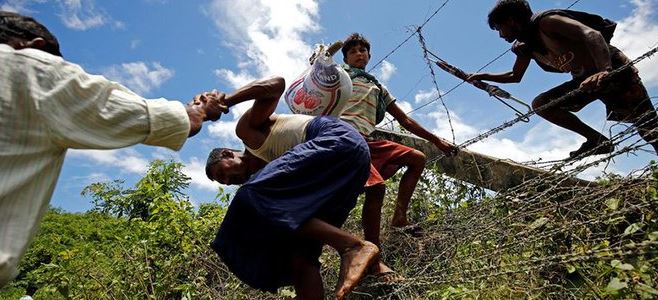Bangladesh has heightened its border security measures amid a significant increase in Rohingya refugees crossing from Myanmar. Over the past few months, at least 18,000 Rohingya Muslims have fled escalating violence in Myanmar’s western Rakhine state, according to officials in Dhaka.
The surge in refugees comes as clashes intensify between Myanmar’s military junta and the Arakan Army, a powerful ethnic militia. The violence has driven thousands to seek safety in Bangladesh, creating a humanitarian crisis at the border.
Also Read: Lawmakers Review Proposal to Raise Retirement Age in Aging China
“Thousands of Rohingya are arriving in Bangladesh, and many more are waiting to cross. The situation is critical,” said a foreign ministry official, who requested anonymity due to media restrictions.
The new arrivals add to the over one million Rohingya refugees already residing in overcrowded camps in Cox’s Bazar district. These refugees fled a brutal military crackdown in Myanmar in 2017 and face severe restrictions in Myanmar, including the denial of citizenship and basic rights.
The number of new arrivals has more than doubled from earlier government estimates. Despite Bangladesh’s repeated statements about its inability to accept additional refugees due to strained resources, the situation continues to worsen.
“The increased vigilance at the border is necessary, but managing our 271 km (168 miles) border with Myanmar is challenging, particularly without a corresponding security presence on the other side,” said another government official, speaking on condition of anonymity.
Many Rohingya refugees are reportedly desperate and finding illicit ways to cross into Bangladesh. The government is yet to decide whether to register the new arrivals and integrate them into existing refugee camps.
“If we choose to register them, it could potentially lead to an uncontrollable influx,” the foreign ministry official noted. “However, we must address this issue sooner or later.”
Muhammad Yunus, the head of Bangladesh’s interim government and a Nobel Peace Prize laureate, has advocated for expedited third-country resettlement as a long-term solution. However, progress on this front has been limited. Since the resumption of the resettlement program in 2022, about 2,000 refugees have been relocated, with the United States, Canada, Australia, New Zealand, and Ireland among the nations participating in the effort.
Key Points
Border Security Increase: Bangladesh has intensified vigilance at its border with Myanmar due to a surge in Rohingya refugees fleeing violence.
Rising Refugee Numbers: At least 18,000 Rohingya have crossed into Bangladesh recently, with the influx attributed to escalating conflict between Myanmar’s military junta and the Arakan Army.
Current Refugee Situation: The new arrivals join over one million Rohingya already in crowded Cox’s Bazar camps, who fled a military crackdown in 2017.
Government Concerns: The Bangladeshi government faces challenges managing its 271 km border with Myanmar and is deliberating whether to register the new refugees.
Humanitarian Crisis: The situation is described as dire, with many refugees desperate and attempting illicit crossings.
Resettlement Efforts: Nobel Peace Prize laureate Muhammad Yunus has called for expedited third-country resettlement, though progress has been slow. Approximately 2,000 refugees have been resettled since 2022, with countries like the US, Canada, and Australia participating.
Registration Concerns: Officials worry that registering new refugees could lead to an uncontrollable influx, complicating the already strained resources.



